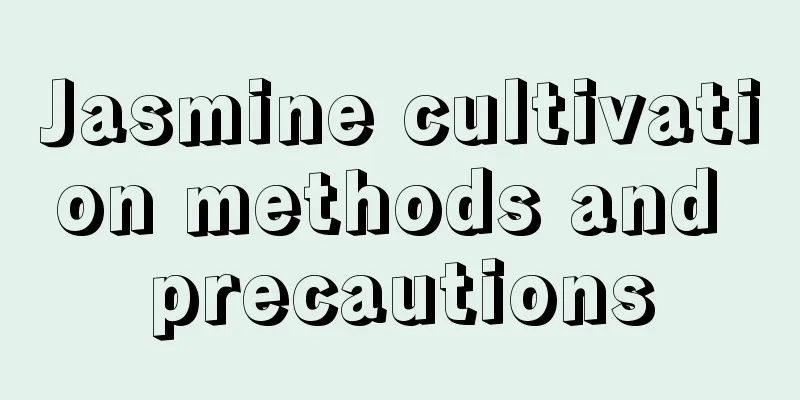Jasmine cultivation methods and precautions

1. TemperatureBecause jasmine is native to India, it prefers high temperatures, so you must take anti-cold measures in winter to prevent frostbite. 2. PruningJasmine is actually a vine plant, so when it is cultivated, there will be problems with individual branches growing too long, which looks abrupt on the plant and affects its appearance. We need to prune the jasmine to maintain a plump plant shape. This type of branch tends to grow more vigorously. When pruning it, do not simply cut it flush with other branches. It should be slightly concave and shorter than other branches. In this way, the branches that grow after the plant sprouts again will have a certain amount of growth space. The pruned branches can be used for cuttings. In an environment where the temperature is above 20 degrees, insert the section close to the cut of the branch into the soil. Provide suitable climatic conditions and it will take root and grow into a new plant. 3. WaterJasmine likes a humid environment, so it has high requirements for water and cannot be placed in a relatively dry environment. If the soil in the pot is too dry, the root system will be damaged. 4. LightingJasmine likes strong light. There is a saying among the people that "jasmine can't be killed by the sun". As long as it is placed in the sun during the growing season, it will grow well. If the plant is grown in a dark place for a long time, the branches will become thin and weak, and the branches will turn yellow, fall off, or become burnt and dry. 5. FertilizationJasmine flowers bloom a lot, so they consume a lot of nutrients. During the growth process of jasmine, thin compost should be added about once every half a month. Fertilizers can be selected from commonly used organic fertilizers, such as fermented bean cake water, compost, etc. You can also use slow-release fertilizers and compound fertilizers on the market. When applying fertilizer, follow the principle of "applying small amounts frequently" and do not apply too much fertilizer at one time, especially in winter and high temperature seasons. Fertilization will be more effective if it enters the growth period. 6. Pests and diseasesSometimes you will encounter red spider mites, and irregular small yellow dots will appear on the leaves. The yellow dots are relatively small, about the size of a pinhole. If you turn over the leaves, you can find white flocs, which are the residues of the red spider's silkening and peeling. Solution: We can wash the back of the leaves with water. If the problem is serious, we need to spray the entire plant with acaricide to kill the red spider. |
<<: Breeding methods and precautions of Zephyranthes
Recommend
What kind of soil is suitable for hyacinth? Can hyacinth be grown at home?
1. What kind of soil is suitable 1. Requirements:...
Are lilies shade-loving or sun-loving plants?
Do lilies prefer shade or sun? Lily is a plant of...
How to grow Dianthus barbatus
1. Soil It is best to plant it in fertile, loose,...
Which month is best to plant saffron?
Saffron, also known as crocus, is famous for its ...
Can I plant bamboo on the balcony?
Can bamboo be planted on the balcony? Bamboo can ...
What to do if gardenia has scale insects
1. Introduction to pests It mainly harms branches...
Can mango trees be planted in the south?
Can mango trees be grown in the south? Mangoes ca...
Is Desert Rose Poisonous?
Desert rose is poisonous The whole plant of Deser...
How to grow purslane trees so they bloom
Purslane tree blossoms The flowering period of th...
Cultivation methods and precautions of morning glory
1. Maintenance methods 1. Substrate selection: Mo...
What areas are suitable for growing Shansu?
Planting conditions of shansu When planting mount...
How to grow succulents in summer
1. Temperature Usually it is not resistant to hig...
The flower language and meaning of fortune seeds, what are the taboos of giving them as gifts
1. Flower Language 1. Continuous wealth: The plan...
The correct way to water Lithops
The potting soil should be moist in winter and sp...
Can roses be propagated by cuttings?
1. Can it be propagated by cuttings? It can be pr...









